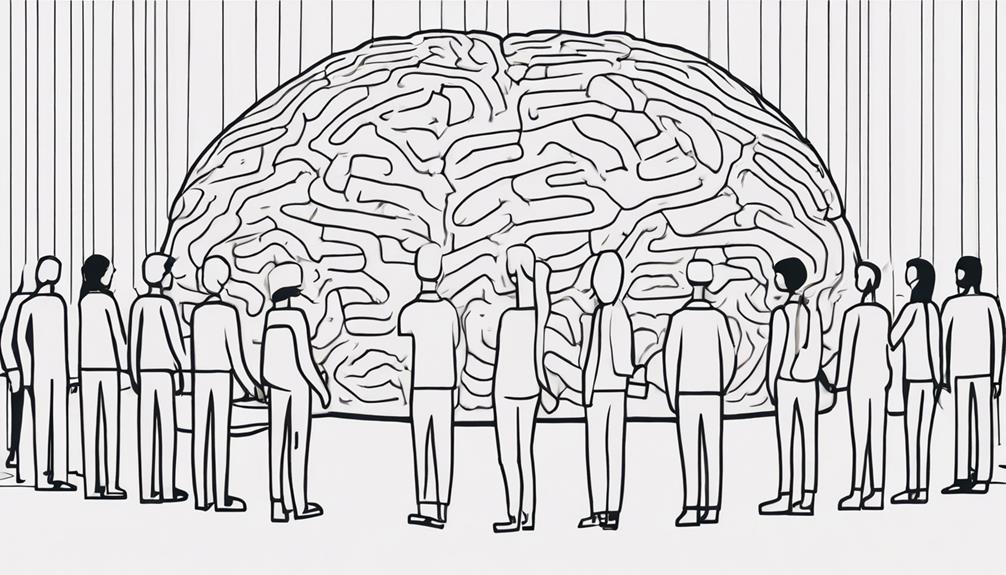The intersection of artificial intelligence and ethics presents a complex landscape that demands careful examination. As AI systems evolve, questions surrounding morality, fairness, and accountability become increasingly pertinent. Issues such as algorithmic bias, privacy infringements, and the implications of autonomous decision-making raise critical ethical dilemmas. The ethical considerations embedded in AI development have far-reaching implications for society, necessitating a nuanced understanding of the ethical frameworks required to navigate this terrain. By exploring the ethical dimensions of AI, we can uncover the intricate interplay between technology and morality, prompting reflections on the ethical underpinnings of our increasingly AI-driven world.
Key Takeaways
- Biases in AI systems challenge ethical decision-making.
- Transparency and accountability are essential for ethical AI development.
- Fairness in AI requires addressing biases and ensuring accountability.
- Ethical AI principles promote transparency, accountability, and fairness.
Ethical Challenges in AI Development

The exploration of ethical challenges in the realm of artificial intelligence development reveals a landscape fraught with concerns over biases, transparency, and the potential for discriminatory outcomes. Biases in AI systems, whether related to health, employment, creditworthiness, or criminal justice, raise significant ethical concerns. Maintaining objectivity in algorithmic decision-making processes is essential but complex, as programmers and datasets may inadvertently introduce biases. These biases can lead to discriminatory outcomes, amplifying existing societal disparities. Moreover, the lack of transparency in AI decision-making poses a risk of reinforcing discriminatory practices. UNESCO specifically underscores the importance of addressing gender bias in AI to prevent the perpetuation of harmful stereotypes. Ethical considerations in AI applications are crucial not only to ensure fairness and justice but also to prevent the exacerbation of societal divisions. As AI continues to advance, navigating these ethical challenges will be paramount to harnessing its potential for the betterment of society.
Transparency and Accountability in AI
Transparency in AI is crucial for understanding the decision-making processes of AI systems, ensuring that users and stakeholders have clarity on how conclusions are reached. Accountability in AI holds developers and organizations responsible for the outcomes and decisions made by AI algorithms, playing a vital role in addressing errors, biases, and ethical concerns effectively. Lack of transparency can lead to challenges in comprehending the rationale behind AI decisions, emphasizing the importance of establishing clear accountability measures to maintain trust and fairness in AI systems.
Ethical AI Decision-Making
Effective ethical decision-making in the realm of artificial intelligence necessitates a clear and accountable process that upholds fairness and mitigates potential biases and discriminatory outcomes. Transparency in AI decision-making involves making the process and outcomes of AI algorithms understandable and clear to users and stakeholders. Accountability ensures that those responsible for AI systems are answerable for their decisions. Ethical AI frameworks stress transparency and accountability to mitigate bias, discrimination, and unjust outcomes. The lack of transparency and accountability can lead to mistrust, ethical dilemmas, and negative societal impacts. Establishing clear guidelines for transparent and accountable AI decision-making is crucial for fostering trust, fairness, and ethical responsibility in AI technologies.
| Ethical AI Decision-Making | ||
|---|---|---|
| Transparency | Accountability | Fairness |
| Mitigate Bias | Reduce Discrimination | Societal Impacts |
Ensuring AI FAIrness
In ensuring fairness in AI applications, a fundamental requirement is establishing clear accountability mechanisms for the decisions and outcomes of AI systems. Transparency in AI involves making the decision-making process understandable and traceable to ensure accountability. Accountability in AI requires clear identification of responsible parties for the outcomes of AI systems. Bias mitigation strategies in AI aim to address and eliminate unfair discrimination in algorithmic decision-making processes. Ethical AI principles development focuses on establishing guidelines to promote fairness, transparency, and accountability in AI applications. Explainability in AI pertains to the ability to provide understandable explanations for AI-generated decisions and actions. These factors collectively contribute to creating a more ethical and just AI environment.
Bias and Discrimination in AI Algorithms

Bias and discrimination in AI algorithms pose significant ethical challenges in the realm of artificial intelligence research and development. AI systems can inherit biases from training data or flawed design choices, leading to discriminatory outcomes. Studies have revealed instances of gender and racial biases in AI algorithms, influencing decision-making processes. These biases can perpetuate societal inequalities and reinforce harmful stereotypes, ultimately impacting individuals' opportunities and treatment. Addressing bias and discrimination in AI algorithms is crucial to uphold fairness and ethical standards. Efforts to mitigate these issues include the implementation of fairness-aware machine learning techniques and ensuring diverse representation in data collection. By incorporating these strategies, the goal is to create AI systems that are more equitable and unbiased in their decision-making processes, thus contributing to a more ethical deployment of artificial intelligence technologies.
Privacy Concerns With AI Technology
The ethical challenges presented by bias and discrimination in AI algorithms extend to privacy concerns with AI technology, particularly regarding the extensive collection and analysis of personal data. When addressing privacy concerns related to AI technology, several key points should be considered:
- Data privacy violations occur when AI systems access and use sensitive information without consent.
- Lack of transparency in AI algorithms can lead to challenges in understanding how personal data is processed.
- AI technology poses legal risks related to copyright infringement and exposure to legal liabilities.
- Ensuring data provenance and compliance with privacy regulations are crucial steps in mitigating privacy risks associated with AI technologies.
These aspects highlight the importance of maintaining transparency in AI processes, respecting data privacy regulations, and safeguarding sensitive information to minimize the ethical implications and potential harm stemming from the use of AI technology.
Legal Implications of AI Advancements

Advancements in artificial intelligence within legal systems hold the potential to revolutionize case evaluations and enhance decision-making processes. By leveraging AI advancements, legal professionals can expedite the analysis of vast amounts of data, leading to more informed and efficient decision-making. This technological progress not only streamlines legal procedures but also has the capacity to promote fairness in the criminal justice system by reducing human error and bias.
However, the integration of AI in legal systems also poses challenges. Ensuring transparency in AI decision-making processes is essential to uphold accountability and trust. Moreover, there is a critical need to mitigate the risk of biased outcomes that could perpetuate discrimination. To address these concerns, ethical considerations must be at the forefront of developing and implementing AI technologies in the legal sector.
UNESCO underscores the significance of adopting frameworks that prioritize ethical standards and unbiased decision-making to safeguard against potential harm in legal AI applications. By navigating these complexities and embracing ethical guidelines, the legal field can harness the full potential of AI advancements while upholding principles of fairness and justice.
Impact of AI on Job Displacement
With the rapid advancement of artificial intelligence, the consequential impact on job displacement is a pressing concern across various industries worldwide. AI's potential to automate tasks raises alarms about the future of work and the displacement of human workers. Estimates suggest that up to 800 million jobs could be automated by 2030, affecting industries like manufacturing, transportation, customer service, and administrative roles. This shift towards automation can lead to economic disruptions, necessitating the reskilling of workers for new roles. As AI displaces routine tasks, there is a growing need for human workers to transition towards more complex, cognitive, and creative job functions. To address these challenges, organizations are exploring strategies such as upskilling, reskilling, and job redesign to mitigate the impact of AI-induced job displacement on the workforce. The transformation of the job market due to AI requires proactive measures to ensure a smooth transition for workers into the new landscape.
Ethical Decision-Making in AI Systems

Ethical decision-making in AI systems is crucial to address issues like bias and ensure accountability. By focusing on transparency and unbiasedness, AI algorithms can promote ethical standards and trust. Establishing clear ethical guidelines helps mitigate risks and enhances responsible AI deployment.
Bias in AI Decisions
Bias in AI decisions within the realm of ethical decision-making in AI systems stems from various sources, including skewed data sets, algorithmic design flaws, and human intervention, all of which can lead to discriminatory outcomes.
- Skewed Data Sets: Inaccurate or incomplete data inputs can reinforce existing biases and perpetuate discrimination.
- Algorithm Design: Biased algorithms may amplify discriminatory patterns present in the data, resulting in unfair decisions.
- Human Intervention: Biases introduced during the development or deployment of AI systems can further exacerbate discriminatory outcomes.
- Mitigate Bias: Efforts to combat bias in AI involve transparent practices, diverse data sources, unbiased algorithm development, and ongoing monitoring to ensure ethical decision-making.
Accountability in AI
Accountability in the realm of Artificial Intelligence demands a meticulous and systematic approach to ensuring transparency, explainability, and impartiality in the decision-making processes of AI systems. Ethical decision-making in AI hinges on the ability to trace and comprehend the data-driven pathways leading to specific outcomes, thereby holding AI systems accountable for their actions. Establishing robust guidelines and standards for accountability in AI is paramount to address the ethical implications that arise from the utilization of AI technologies. Failure to uphold accountability in AI can result in unintended consequences, perpetuation of bias, and potential harm to individuals and society at large. By implementing stringent accountability measures in AI systems, trust can be fostered, ethical practices promoted, and risks associated with AI deployment can be mitigated effectively.
Ensuring Human Control Over AI Applications
How can we ensure that AI applications maintain human oversight to prevent potential harm and uphold ethical standards? Human control over AI applications is essential in guiding their development and deployment responsibly. To achieve this, clear guidelines and boundaries must be established to govern the behavior of AI systems. Human oversight serves as a safeguard against the risk of AI making decisions that could have detrimental effects on individuals or society as a whole. Ethical considerations dictate that ultimate authority in critical decision-making processes involving AI should rest with humans. By creating frameworks that enable human intervention in AI operations, accountability and transparency can be maintained throughout the AI lifecycle. Striking a delicate balance between granting autonomy to AI systems and retaining human control is paramount to ensure that ethical standards are upheld in the ever-evolving landscape of AI technologies.
Frequently Asked Questions
How Does Artificial Intelligence Affect Society and Ethics?
Artificial intelligence profoundly influences society and ethics by impacting decision-making processes, raising privacy concerns, and requiring accountability measures. AI's role in bias detection and trustworthiness evaluation challenges ethical frameworks. Ensuring social responsibility in AI deployment necessitates balancing technological advancements with ethical values. Addressing these complexities is crucial for fostering ethical practices and mitigating societal risks associated with AI integration.
What Are the Ethical Implications of Artificial Intelligence?
Privacy concerns, bias detection, accountability measures, decision-making processes, transparency standards, fairness evaluations, and moral dilemmas are key aspects of the ethical implications of artificial intelligence. These elements are essential for ensuring the responsible development and deployment of AI technologies. Just as a skilled detective uncovers hidden truths, stakeholders must diligently investigate and address these ethical considerations to uphold integrity and trust in AI systems across various sectors.
What Is the Role of AI in Ethics?
Artificial Intelligence (AI) plays a pivotal role in shaping ethical considerations by aiding in ethical decision-making processes. It contributes to moral responsibility by providing data-driven insights and analysis, helping navigate ethical dilemmas. AI's integration necessitates the development and application of ethical frameworks to ensure alignment with ethical principles and considerations. The role of AI in ethics underscores the importance of ethical reasoning, transparency, and accountability in responsible AI deployment.
How Does AI Affect Work Ethic?
AI impacts work ethic through job displacement, task automation, and human oversight. While it enhances efficiency and skill development, accountability issues and ethical decision-making become crucial. Maintaining work-life balance amidst AI deployment is a challenge. Organizations must navigate these complexities to ensure a harmonious blend of human and AI contributions, fostering a work environment that upholds ethical standards and promotes meaningful work experiences for employees.
Conclusion
In conclusion, the intertwining of artificial intelligence and ethics presents a complex web of challenges and opportunities. As AI technologies continue to advance, it is imperative for ethical frameworks to guide their development and deployment. Symbolically, AI can be seen as a double-edged sword, capable of great good and harm. It is essential for society to carefully navigate these ethical dilemmas to ensure that the benefits of AI are maximized while minimizing potential risks.
